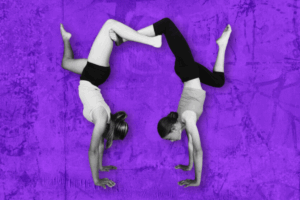By listening to their personal stories and perspectives, we can gain a deeper understanding of the rewards and challenges of foster care and the profound positive impact it has on both the carers and children involved.

Sean and Amanda
Sean and Amanda have been respite carers supported by Lutheran Care since 2017. They provide a warm and welcoming home to four children between the ages of 11 and 16, offering regular respite care two weekends a month. Their unwavering commitment and dedication to respite care have not gone unnoticed, as Lutheran Care nominated them for the 2022 SA Child Protection Awards.
What inspired you to become foster carers, and how did you get started?
We’ve always wanted to look after children. Unfortunately we can’t have biological children but we still wanted to help children. We always wanted to start a family.
Can you describe the process you went through to become foster carers?
We were favouring adoption but also considering fostering. We went to information sessions on each one to understand the process and what’s involved and what it could look like. After we decided to foster, we did quite a few assessments involving loads of questions, some quite personal and confronting. It’s all to gain an insight into what we understand and possibly suggest further training.
How many children have you fostered so far, and how long have they stayed with you?
We’ve been fostering since January 2018. We started with a couple of weekend respites, then an emergency care, which turned into short-term care. The toddlers we had short-term were reunited with family after 4 months with us. We took a break
from fostering for roughly a year as Amanda had major surgery and needed a long recovery. After 12 months we started fostering again and chose respite care only, and really enjoyed it and felt it suited us perfectly! We feel respite works out well for everyone involved, the children, their full-time carers, and for us as respite carers – it’s a win-win- win! We’ve had the same children for respite for almost 4 years now.
What are some of the biggest challenges you’ve faced as foster carers, and how have you overcome them?
Sometimes managing some behaviours is really challenging but we receive great help and support from Lutheran Care.
What kind of support and resources are available to foster carers in Australia?
Lutheran Care are a great help and offer a lot of support. We are able to do further training if we choose, which is very valuable.
What has been the most rewarding part of fostering for you?
Watching children grow up and develop. Being able to help them through rough patches, and see them thrive.
How do you help the children in your care adjust to a new home and family environment?
Offering softs toys/teddies. Fun activities together, asking them what they like to eat and also cooking together. Hanging pictures they’ve drawn, and displaying things they’ve made.
Can you share any particularly memorable experiences you’ve had as foster carers?
Being part of reuniting children with their biological family.
How do you balance the needs of the children in your care with the needs of your own family and personal life?
We feel respite can be sort of easy most of the time. There’s always challenges but we manage well because we have great supports, such as our support worker at Lutheran Care who we can talk to about anything.
What advice would you give to someone who is considering becoming a foster carer?
Go to an information session to understand what’s involved. Talk to foster carers if you can. Knowing that there’s different options available, and being aware that there’s after hours support available too.
Crystal and Wesley
Crystal and Wesley are reunification carers with Centacare Foster Care. They offer invaluable short-term care for children whose families are working through issues that place their safety at risk. They also have two biological children of their own.
What inspired you to become foster carers, and how did you get started?
We are originally from South Africa, lived in New Zealand for 13 years and now in South Australia. We realised that no matter where you are in the world, there are families and children everywhere that need help, and we wanted to offer that help in whatever way we could.
Strangely in our short time living in Adelaide I met a few foster carers. I jokingly said to my husband “it’s a sign, the universe is trying to tell us something.” One of the ladies I met told me about Centacare, and that was it, I made the application.
Can you describe the process you went through to become foster carers?
Once in contact with the agency, Centacare, there are quite a few training courses to complete and clearances to obtain. The entire process for us was long, but well worth it!
How many children have you fostered so far, and how long have they stayed with you?
We are new foster carers, so thus far we have had two children, for 4 months.
What are some of the biggest challenges you’ve faced as foster carers, and how have you overcome them?
The biggest challenge for us is balancing the quality time my own children need while having two foster children that also need attention.
School holidays are a lot easier as between myself and my husband we divide and conquer! During school, we need to balance the childrens’ after school activities and homework. Overcoming these challenges, we have good routines in place and we stick to them. Bedtime happens on time, younger children go to bed earlier, which means my own children get my full attention before their bedtime.
What kind of support and resources are available to foster carers in Australia?
Any information that I needed, Centacare sourced and provided. They have been absolutely brilliant. Along with that, continuous training is provided throughout the year.
What has been the most rewarding part of fostering for you?
Seeing the progress of the children from when they first accepted us as their carers to now. It amazes us to see how far they’ve progressed with what we’ve put in place for them.
How do you help the children in your care adjust to a new home and family environment?
Instilling a routine early on, especially for young children; keeping change to a minimum. Lots of activities at home such as drawing, paintings and even picking up toys at the end of the day before bedtime.
Can you share any particularly memorable experiences you’ve had as foster carers?
Family beach trips are our favourite. Seeing their faces light up as soon as we park our car. We are creating memories every day and as new foster carers I hope to soon have a long list!
What advice would you give to someone who is considering becoming a foster carer?
There are so many children in need. If you have the patience, the love and guidance to give, go for gold! It is a rollercoaster journey for the foster family and the foster children!
Robert
Robert is a committed caregiver providing respite care for one child and full-time care for another. His colleagues at a school, where he volunteers, recognised his ability to connect with young people and encouraged him to become a carer. Robert loves spending time with the children he cares for, taking them on fun outdoor adventures like boogie-boarding, fishing, and kayaking, and organising breakfast clubs.
What inspired you to become a foster carer, and how did you get started?
I first became inspired to become a foster carer when a friend of mine had three foster boys. She suggested to me I should look into it. That was about 20 years ago now. Following that when I started working in schools—because I’m quite good with the children—someone said, have you thought about doing foster care?
Can you describe the process you went through to become a foster carer?
I contacted Uniting Communities who took my details and made an appointment to have an initial chat. It was a long process with a few interruptions because of COVID.
How many children have you cared for so far, and how long have they stayed with you?
I started last year in January. I’ve taken care of a number of children on respite, some who have had difficulties at home, or needed care while other care could be arranged. I currently provide full time care for one child and rotating respite to another— they’re becoming buddies!
What are some of the biggest challenges you’ve faced as a foster carer, and how have you overcome them?
One of the bigger challenges would have been the adjustment to the children when they first come here, it’s sort of being able to read them and understand them.
We’ve heard you’ve taken the children boogie boarding, snorkelling, fishing and kayaking. Was this a highlight for you and how did the children respond?
Children quite enjoy it, it’s very rewarding. It would be great to be able to do it more often, because the kids respond well to it. They talk about wanting to do it again!
How do you help the children in your care adjust to a new home and family environment?
By being supportive and making them feel comfortable by way of their needs. We have rules in the house. The biggest house rules are respect, responsibility, and manners. Mostly, I help them feel they are in a comfort zone.
Can you share any particularly memorable experience you’ve had as a foster carer?
One of the most memorable was when one of the boys first came here. I do a lot of woodwork, and we built a truck in the shed together and he’s cherished that as a model.
Seeing another one of the boys achieve at Eight Ball was quite rewarding for me. I taught him how to play and he was bragging when he came on respite to say how well he’d done and he beat all the other children on camp and they said, who taught you to play? And he said, my carer Rob.
So, any rewarding things the children can learn and achieve and boost themselves up with is quite uplifting for me. Just seeing them achieve and conquer something.
What advice would you give to someone who is considering becoming a foster carer?
My advice to them would be to firmly consider the needs of the child before you engage in the process of becoming a foster carer. The child will come from a bruised background, so be prepared for anything.
To find out more about becoming a foster carer:
childprotection.sa.gov.au
or call 1300 2 FOSTER (367 837)
Follow KIDDO on Instagram and Facebook, and subscribe to our weekly newsletter








